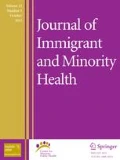Abstract
The present study examined the extent to which limited English proficiency (LEP) poses a risk to health service use in Asian Americans. With data drawn from the 2015 Asian American Quality of Life Survey (N = 2594), logistic regression was used to model the odds for four outcomes (no usual place for care, no regular check-up, unmet needs for medical care, and communication problems in healthcare settings). More than 62% of the sample had LEP. In the group with LEP, the odds of not having usual place for care increased by 2.09 times, of not having regular check-up by 1.69 times, of having unmet needs for medical care by 1.89 times, and of having communication problems in healthcare settings by 4.95 times. The findings highlight the vulnerabilities of Asian Americans with LEP in health service use and provide implications for health planning and interventions.
Similar content being viewed by others
References
Pandya C, McHugh M, Batalova J. Limited English proficient individuals in the United States: number, share, growth, and linguistic diversity. Washington, DC: Migration Policy Institute; 2011.
Zong J, Batalova J. The limited English proficient population in the United States. Washington, DC: Migration Policy Institute; 2015.
Ramakrishnan K, Ahmad FZ. State of Asian Americans and Pacific Islanders Series: a multifaceted portrait of a growing population. Washington, DC: Center for American Progress. Progress 2050. 2014.
Pew Research Center: The rise of Asian Americans. Washington, DC: Pew Research Center; 2013.
Pew Research Center: Key facts about Asian Americans, a diverse and growing population. http://www.pewresearch.org/fact-tank/2017/09/08/key-facts-about-asian-americans/. Accessed 3 Nov 2017
UCLA Center for Health Policy Research: CHIS 2015 methodology report 2. Los Angeles: UCLA Center for Health Policy Research; 2016.
Islam NS, Khan S, Kwon S, Jang D, Ro M, Trin-Shevrin S. Methodological issues in the collection, analysis, and reporting of granular data in Asian American populations: historical challenges and potential solutions. J Health Care Poor Underserved. 2010;21:1354–81.
Jang Y, Park NS, Yoon H, Huang Y, Rhee M, Chiriboga DA, Kim MT. The risk typology of healthcare access and its association with unmet healthcare needs in Asian Americans. Health Soc Care Commun. 2018;26:72–9.
Flores G. Language barriers to health care in the United States. New Engl J Med. 2006;355:229–31.
Beal AC, Doty MM, Hernandez SE, Shea KK, Davis K. Closing the divide: how medical homes promote equity in health care. New York: Commonwealth Fund; 2007.
Chevarley FM. Percentage of persons unable to get or delayed in getting needed medical care. In: Dental care, or prescription medicines: United States, 2007 (Medical Expenditure Panel Survey Statistical Brief No. 282). Rockville: Agency for Healthcare Research and Quality; 2010.
Shi L, Stevens GD. Vulnerability and unmet health care needs. J Gen Intern Med. 2005;20:148–54.
Derose KP, Escarce JJ, Lurie N. Immigrants and health care: sources of vulnerability. Health Aff. 2007;26:1258–68.
Jacobs E, Chen AH, Karliner LS, Agger-Gupta NI, Mutha S. The need for more research on language barriers in health care: a proposed research agenda. Milbank Q. 2006;84:111–33.
Lillie-Blanton M, Hoffman C. The role of health insurance coverage in reducing racial/ethnic disparities in health care. Health Aff. 2005;24:398–408.
Johnson RL, Roter D, Powe NR, Cooper LA. Patient race/ethnicity and quality of patient–physician communication during medical visits. Am J Public Health. 2004;94:2084–90.
Street RL, Makoul G, Arora NK, Epstein RM. How does communication heal? Pathways linking clinician–patient communication to health outcomes. Patient Educ Couns. 2009;74:295–301.
Ngo-Metzger Q, Sorkin DH, Phillips RS, Greenfield S, Massagli MP, Clarridge B, Kaplan SH. Providing high-quality care for limited English proficient patients: The importance of language concordance and interpreter use. J Gen Intern Med. 2007;22:324–30.
City of Austin: Resolution no. 20131024-056. http://www.austintexas.gov/edims/document.cfm?id=200017. Accessed 3 Nov 2017
City of Austin: Asian American Quality of Life. http://austintexas.gov/department/documents-3. Accessed 3 Nov 2017
Jacobs EA, Lauderdale DS, Meltzer D, Shorey JM, Levinson W, Thisted RA. Impact of interpreter services on delivery of health care to limited-English-proficient patients. J Gen Intern Med. 2001;16:468–74.
Graham EA, Jacobs TA, Kwan-Gett TS, Cover J. Health services utilization by low-income limited English proficient adults. J Immigr Minor Health. 2008;10:207–17.
Acknowledgements
This work was supported by the National Institute on Aging (R01AG047106), the City of Austin’s Asian American Quality of Life initiative (Contract No. 26-8275-39), and the Expedited Proposal Enhancement Grant from the Center for Transdisciplinary Collaborative Research in Self-management Science (P30, NR015335) at The University of Texas at Austin School of Nursing.
Author information
Authors and Affiliations
Corresponding author
Ethics declarations
Conflict of interest
There are no potential conflicts of interest for either of the authors.
Rights and permissions
About this article
Cite this article
Jang, Y., Kim, M.T. Limited English Proficiency and Health Service Use in Asian Americans. J Immigrant Minority Health 21, 264–270 (2019). https://doi.org/10.1007/s10903-018-0763-0
Published:
Issue Date:
DOI: https://doi.org/10.1007/s10903-018-0763-0



